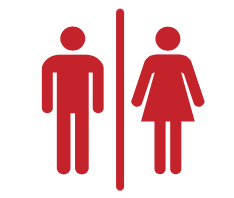The government is proposing to remove the need for a medical diagnosis of gender dysphoria before someone is able to apply for gender recognition. But can you choose your gender?
Yes: Growing up, when I tried to imagine myself as a woman, I could see nothing—and that made me suicidal. However, I would see flickers of a man, the man I eventually became… and that, I knew, was iniquitous; sinful.
I eventually became Stephen in 1975. Yet I was still and would remain a woman in law. When my (now) wife gave birth to our children, I was a stranger to them. I could not register as their father, nor adopt them, as the law said we were a lesbian couple and same-sex marriage did not then exist. I was an outlaw. The Gender Recognition Act changed all that, and by 2006, I had been made a professor, received an OBE, had married my wife, and adopted our children. The unbelievable had happened, and the sky had not fallen down.
In 1977, I had not had gender reassignment surgery, but was taking testosterone, so my wife met a standard-issue short, slight, trans man with a full beard. When our relationship showed signs of becoming intimate, I was certain that when she saw the catastrophe of my body, she would shun me. But then, one morning, she told me that she had suddenly understood it—the “it” being transsexuality. “Clearly,” she said, “Some women, a tiny proportion, are born with penises, and a similarly small group of men are born with vaginas.” And that was that.
She was 18, just out of school, and she got it, so why did no one else? They didn’t because they reasoned gender was sex. But gender to sex, is like race to skin. A conjecture put forward by white men to justify their ongoing oppression of others. Now that we understand that gender, like race, was never real, we can choose whether to include it as part of our personal cultural and social expression, and if we desire, we can change it.
No: We must welcome the fact that intersex people with confused genitalia are now treated with compassion. Similarly we must accept that a very few people suffer from gender dysphoria, which may have a physical basis. In either case we should respect the wishes of these human beings as to the physical and cultural expression of gender which they wish to adopt. I also agree with you that “race” is a cultural construct made in the interests of white power, based on a naturalism claiming scientific credentials. I also agree that gender has been expressed in very different ways historically.
However, I do not feel that gender can be entirely distinguished from sex. Throughout most of the organic realm, gender occurs exhaustively as male or female. It is through the conjunction of the two categories that life reproduces itself. Exceptions only prove this rule. And we now know that, genetically, maleness and femaleness are equally fundamental: neither is an “accidental” qualification of the other, as often used to be thought.
It follows that, to be a human animal is to be either male or female. Thus for most people, gender is a given: a matter of fact. To make it a matter of choice for all would be to encourage the wider liberal-capitalist illusion that the human subject is an uncharacterised empty will, detached from her body of which she is the mere proprietor.
On the basis of this, much misery would ensue, especially for children. Every tomboy, or male equivalent, would now be encouraged to see perfectly normal likings for things traditionally associated with the opposite sex as signs of dysphoria. Ironically, the grip of gender stereotypes would be reinforced. Confused children would end up trapped—but not in their bodies, rather in the strange doublethink of the more extreme transsexual campaigners. For them apparently, gender difference matters infinitely, even though (and precisely because) they are differences the individual can choose to shrug off.

Yes: I am not intersex, and was not referring to people with an intersex condition. But as you raised it; babies hardly ever present with “confused” genitalia. Intersex bodies are far more complex than that.
Intersex people are rarely treated with compassion. Some physicians still perform infant genital surgery, damaging forever any ability to enjoy sex. Social mores will further condemn the physically different person. Most people with an intersex condition do not wish to change their registered natal gender, but for the few who are trans, the law is cruel. They are excluded from using the Gender Recognition Act 2004 to change their legal gender.
In early-modern history, male and female were understood as residing in all. In the 18th century European science superseded this with a binary taxonomy of two sexes based on secondary sex characteristics and the reproductive organs. Sex became the biological division of all animals into male, female, or both. In the last 60 years this binary logic has lost its grip. Strengthened by the discovery of male and female sex hormones in the 1920s, research in the 1950s by John Money suggested that hormonal, gonadal, or chromosomal sex and genitals did not determine a person’s “core gender identity”; that personal sense of a gendered self. Money suggested that a person’s gender role was socially “constructed,” ultimately enabling second wave feminism, and the adoption of “trans” as a category of human person.
Most people experience no incongruence between their genitals, other sex characteristics, and their gender. But some have a deep-seated sense of their gender identity as different from that attributed after the cursory glance of a midwife. If they choose to live as they feel, what does it matter to you?
N0: Any lack of compassion towards intersex people is to be condemned—the preferences of gender dysphoric people are to be respected. The argument between us regards your view that the legitimacy of choice for exceptional cases means accepting that gender should always be a matter of individual choosing. You base this on a supposed modern scientific division between sex and gender.
But the science has been both more complex and contested than you suggest in your potted history. Galen’s 2nd century AD theory that humans are all one sex saw the female body as inferior. Though revived in the Renaissance, it had not predominated in the Middle Ages: a fluid sexual duality was the reigning conception then. Followers of the Swiss physician Paracelsus pushed a version of this view into the Renaissance and beyond. However, none of the myriad accounts amounted to the crude postmodern division of sex and gender.
Today this is rightly questioned—including by the left and by feminists—as depending on a strict nature/culture split, which is a fiction. Ironically, the heavy-handed distinction implies both an absolute fixity of sex and an unconstrained fluidity of gender. Yes, there can be degrees of disparity between external and internal sexual manifestations, which older tradition connected to “humours” and we ascribe to hormones. Yet you concede that for most people, most of the time, the inner and the outer are experienced as, on the whole, aligned.
One can note that, for all the endless arguments, it is almost impossible to escape in this instance the language of polarity, however nuanced. For human beings, as humans, do not come neuter. To suggest that they do is indeed to “neuter” our wills and identities in a way that is liable to encourage a sinister posthuman future.

Yes: You assume “sex” as fact: binary, related to reproduction, inscribed on the body, and intertwined with gender. You accept there are exceptions, but I don’t think they prove the rule.
Binary language is key. Gender is not naturally binary. In 1914, Waldemar Borgoras wrote of struggling to describe the not two but nine gender groupings and the multi-gendered sexual and social practices that he observed among Siberian Eskimos. Nor, as you accept, is sex exhaustively male or female. Parthenogenesis is surprisingly common. One third of Whiptail lizards have only one sex, yet they are not clones. Describing them as female—as science does—because they lay eggs, ignores the fact that they also fertilise those eggs. As sole progenitors, our binary “sex language” cannot describe them.
Many elements of sex are not understood. Human brains, for example, contain sex dimorphic nuclei; bundles of neurons different in males and females. We don’t know why they are sex dimorphic—that is, why they are different in men and women—nor how that affects the body or brain. We do know, however, that in trans people, post-mortem studies show that these nuclei present as the opposite of their sex at birth. Whether this means they are of the opposite somatic sex or, like the Whiptail, beyond description in our language, is itself beyond us.
Evidence from early antiquity shows people choosing/changing their gender role or presentation. It is a feature of most cultures, and all societies. As a man, gender possibly seems a singular experience, but just look across at the many “genders” of women. That is the wildly different ways they play out their womanhood. Does that relate to bodily difference? And why are men so boring?
Our gender choices are nobody’s business except, perhaps, our life partner. Sex/gender has already been removed from most law: marriage, welfare benefits, pensions, employment laws, and sexual offences law, to ensure parity of experience. Even pregnancy law is already sex mutable, with maternity benefits available to any qualifying woman or man. It is already becoming a choice.
Do enjoy having the last word, but do also consider exploring the many opportunities gender choice throws up.
No: I agree that we struggle with the language surrounding concepts such as “parthenogenesis.” But the very fact of self-fertilising affirms sexual polarity: two elements are necessarily involved, even if they both come from one organism. As for the Inuit, they code everything in terms of binary gender, and thereby ensure both sexual equality and a self-sustaining reciprocity. The exotic gender variations are related to shamanic practice and a sense of an overarching spiritual unity.
You point out that sex/gender difference shows up even at the neurological level. Cases of dissonance between this and the bodily and genetic levels must, in all logic, be regarded biologically as disordered, although that has no more implication for the ethical treatment of those suffering the disorder than does visual incapacity.
And, to reiterate, we must respect the wishes of the sufferers of all modes of deep personal uncertainty as to gender. However, this suffering has to be socially and legally confirmed. To leave such confirmation up to the feelings or whims of the individual (as the government now desires) is to risk both the exploitation of the natural insecurities of children and young people, and an expensive explosion of unjustifiable sex-changing, with the risk that it could become a widespread fashion.
Indeed this process is already under way, and even now schools who fail to teach small children debatable transgender theories are threatened with closure. Any dissolution of cultural boundaries comes with dangers. And in this case there is danger for women, in terms of the loss of their exclusive safe spaces and recognition of their specific needs. Gender-blind legislation necessarily treat all people as if they did not naturally have babies.
Therefore it treats everyone as men, sometimes to the detriment of our allowing for the specific life-cycles of women and how this impacts on their careers and crucial social contribution. Imposed gender self-determination will not liberate the human will, but flatten people to the status of accidental assemblages, to be ultimately controlled by the (mostly) masters of the modern technocratic state and market.
Can a person choose their gender?













